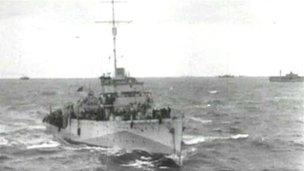Medal ceremony in Wester Ross for Arctic Convoy sailors
- Published
David Craig, Atlantic convoy veteran: "It doesn't mean so much to us because we've had to squeeze it out of the government"
More than 30 veterans of World War II's Russian Arctic Convoys have been presented with medals at a ceremony in Wester Ross.
The men received the Arctic Star, an honour awarded for the first time this year in recognition of service on the dangerous maritime missions.
The sailors worked to keep supplies flowing to the Soviet Union.
The ceremony was held near Loch Ewe, where many of the convoys of ships carrying food and weapons sailed from.
Jock Dempster, from Dunbar, had been among the veterans expected to attend the event.
However, the 85-year-old died on Sunday.
He received the Arctic Star during a ceremony at Downing Street in March.

Winston Churchill said the Arctic Convoy mission was "the most dangerous journey in the world"
Mr Dempster was 16 in 1944 when he first sailed in the convoys, battling extreme weather and German bombardment to help keep a supply line with Russia open.
Veterans, including Mr Dempster, and politicians campaigned for many years for a specific medal to be created in recognition of service on the convoys.
Between 1941 and 1945, merchant ships left Loch Ewe - as well as the Clyde and ports in Iceland - to deliver supplies, weapons and ammunition.
About 3,000 men died during the convoys.
Great Britain, the US and Canada were involved in shipping the supplies.
PQ17 was the most disastrous and infamous of the convoys.
In July 1942, more than 20 vessels were sunk following orders to scatter because of fears of an attack by warships, which included the Tirpitz.
After attending the medal ceremony, Veterans Minister Keith Brown paid tribute to the efforts of the Arctic convoy sailors.
He said: "This group made an immeasurable contribution to the Allied forces' efforts, facing the enemy in some of the toughest conditions anywhere on the planet.
"Their bravery meant vital supply routes were never cut off."
Mr Brown added: "Along with many others, I consistently made a case to the UK government to ensure that this group were not forgotten or lost in history."
Fund-raising is ongoing to cover the costs of building a planned Arctic Convoy museum near Loch Ewe.
- Published6 May 2013
- Published12 March 2013
- Published26 February 2013
- Published14 September 2011
- Published31 August 2011
- Published21 August 2011
- Published19 August 2011